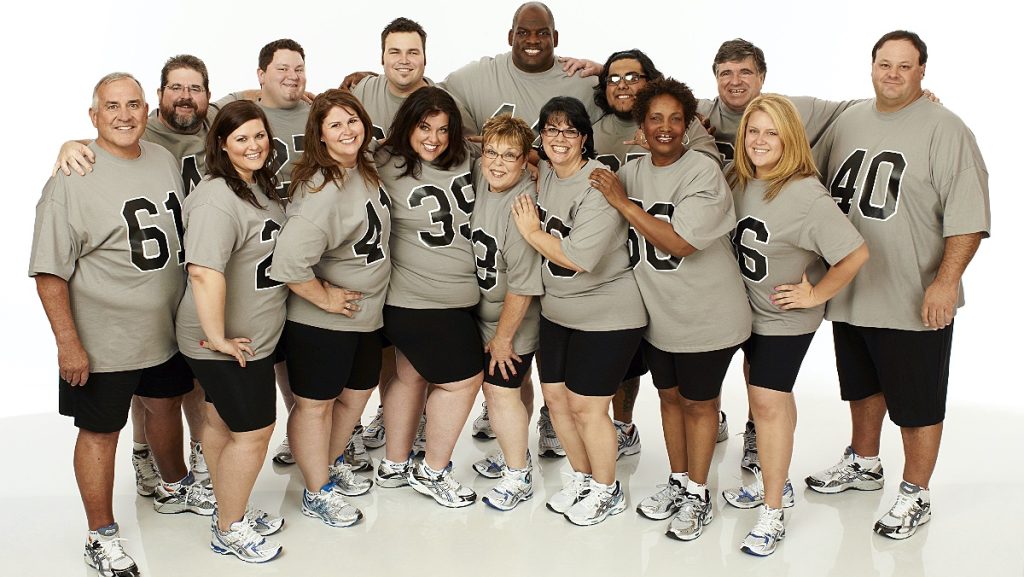In this article:
Losing weight is a common goal for many people who want to improve their health, appearance, and well-being. But how fast should you lose weight? Is it better to shed the pounds quickly or slowly? In this blog post, we will explore the pros and cons of losing weight too fast, using the popular reality TV show “The Biggest Loser” as an example.
What is “The Biggest Loser”?

“The Biggest Loser” was a reality TV show that ran on NBC for over a decade starting in 2004. In it, participants with obesity competed with each other through intense physical challenges and ate a reduced-calorie diet to see who could lose the highest percentage of body weight. The show was meant to inspire viewers to adopt a healthier lifestyle and overcome their weight problems.
The results of “The Biggest Loser” were remarkable, but not in the right way…
The contestants on “The Biggest Loser” achieved remarkable results. They lost an average of more than a hundred pounds each in just 30 weeks. They also improved their blood pressure, cholesterol, blood sugar, and fitness levels. Some of them even reversed their type 2 diabetes or sleep apnea.
However, these results came at a cost. The contestants also experienced drastic changes in their metabolism and hormones that affected their hunger and energy levels. These changes made it very hard for them to maintain their weight loss in the long term.
The cost of “The Biggest Loser” on the health of the contestants
Metabolism is the process by which your body converts food into energy. It determines how many calories you burn at rest and during activity. Hormones are chemical messengers that regulate various functions in your body, including appetite, mood, stress, and sleep.
One of the hormones that affects hunger is leptin. Leptin is produced by fat cells and signals your brain when you are full. When you lose fat, your leptin levels drop, making you feel hungrier and less satisfied with less food.
Studies of contestants from “The Biggest Loser” found that due to their extreme calorie restriction and exercise regimen, their metabolism slowed drastically and their leptin levels plummeted. This means they had to eat much less than before to maintain their weight loss, or else they would gain it back quickly.
Moreover, these metabolic and hormonal changes did not reverse over time. Even after six years, the contestants still had a slower metabolism and lower leptin levels than before the show. This means they had to fight against their own bodies to keep off the weight they had lost.
So, what are the pros and cons of losing weight too fast?
Losing weight too fast can have some benefits, such as:
- Faster results: You can see noticeable changes in your body shape and size in a short period of time.
- Motivation: You can feel more encouraged and confident by achieving your goals quickly.
- Health improvements: You can lower your risk of developing or worsening certain chronic diseases, such as diabetes, heart disease, or arthritis.
However, losing weight too fast can also have some drawbacks, such as:
- Metabolic slowdown: Your body adapts to the low calorie intake by burning fewer calories at rest and during activity.
- Hormonal imbalance: Your appetite-regulating hormones get out of sync with your actual needs, making you feel hungrier and less satisfied.
- Muscle loss: You can lose not only fat but also muscle mass, which can weaken your bones, joints, and immune system.
- Nutrient deficiencies: You can miss out on essential vitamins, minerals, antioxidants, and fiber that your body needs for optimal health.
- Psychological stress: You can experience mood swings, irritability, anxiety, depression, or eating disorders due to the drastic changes in your lifestyle and self-image.
Better ways of losing weight
Losing weight too fast is not sustainable or healthy in the long run. There are better ways of losing weight that are more gradual, balanced, and realistic. These ways involve improving your general health and lifestyle habits, rather than forcing your body through strict diets and workouts.
Some of these habits include:
- Eating a nutritious diet: Choose whole foods that are rich in protein, fiber, healthy fats, and antioxidants. Avoid processed foods that are high in sugar, trans fats. Eat mindfully and listen to your hunger and fullness cues.
- Exercising regularly: Aim for at least 150 minutes of moderate to vigorous physical activity per week. Include a variety of exercises that challenge your cardiovascular system, muscles, and flexibility. Find activities that you enjoy and can stick to.
- Sleeping well: Get at least seven to nine hours of quality sleep every night. Avoid caffeine, alcohol, nicotine, and screens before bed. Follow a regular sleep schedule and create a comfortable and dark sleeping environment.
- Managing stress: Find healthy ways to cope with stress, such as meditation, yoga, breathing exercises, hobbies, or social support. Avoid using food, alcohol, drugs, or smoking as stress relievers.
- Setting realistic goals: Aim for a weight loss rate of one to two pounds per week. Focus on the process rather than the outcome. Celebrate your achievements and learn from your setbacks.
What’s next?
Firstly, let’s debunk a common misconception: obesity is not solely determined by your genes. While researchers have identified several genes that may be associated with an increased risk of developing obesity, it is primarily your habits that contribute to weight gain. No excuses, just reality. Overweight individuals are often unfairly blamed, when in fact they are victims of a society that lacks proper education on nutrition, exercise, and overall health. Unfortunately, we are frequently influenced by poor role models. Age-healthy aims to challenge this paradigm by advocating for a healthier society that discourages detrimental habits.
In this blog post, we have discussed the pros and cons of losing weight too fast, using “The Biggest Loser” as an example. We have also suggested some better ways of losing weight that are more sustainable and healthy.
In the next blog posts, we will dive deeper into each of these habits and explain how they can help you lose weight and improve your health. Stay tuned!
References
– Exercise, metabolism, and weight: New research from The Biggest Loser – Harvard Health https://www.health.harvard.edu/blog/exercise-metabolism-and-weight-new-research-from-the-biggest-loser-202201272676
– Lessons from “The Biggest Loser” – Harvard Health https://www.health.harvard.edu/diet-and-weight-loss/lessons-from-the-biggest-loser





